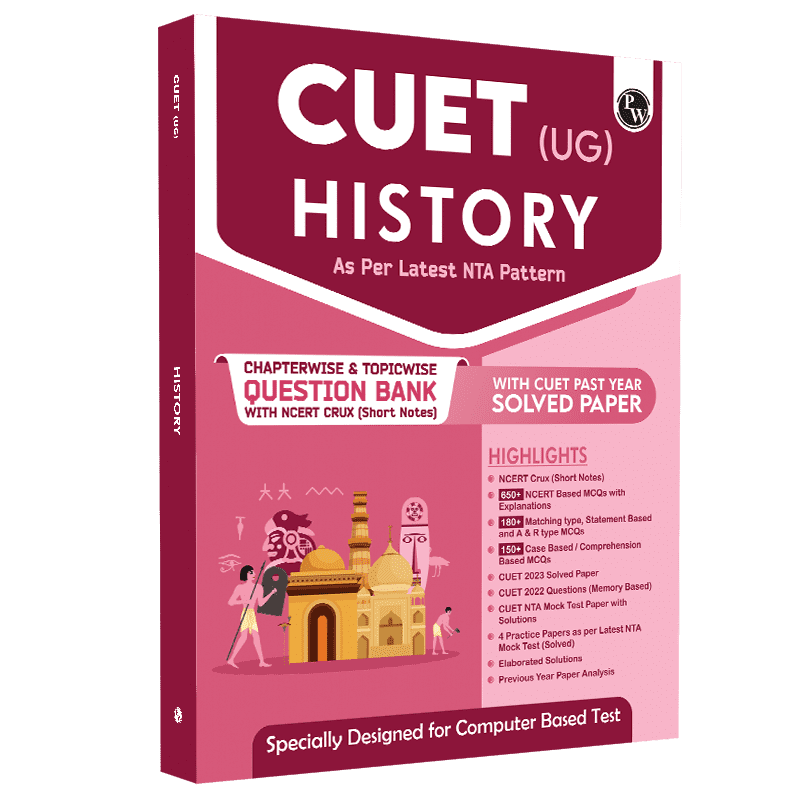CUET History Syllabus, Important Topics and Books

Are you preparing for the CUET UG 2025 exam with History as your domain subject? The Common University Entrance Test (CUET) is an important exam for students who want to study history at top universities in India. If you are preparing for CUET, knowing the syllabus, important topics, and the best books will help you score well. The Common University Entrance Test (CUET) is conducted by the National Testing Agency (NTA) for admission to undergraduate courses in central universities. For subjects like B.A. History (Hons), B.A. Sociology, or B.A. Archaeology, choosing History as your domain subject is essential. The CUET UG History Syllabus covers themes from ancient to modern India, testing your analytical and factual knowledge.
This section will explain the syllabus, important topics, exam pattern, and recommended books in simple terms.
CUET History Syllabus 2025
The History CUET Syllabus is divided into three parts, each focusing on key themes. Below is a simplified table to help you understand the structure:
|
Part |
Theme |
Important Topics |
|
Part I |
Theme I |
The Story of the First Cities: Harappan Archaeology |
|
Theme II |
Political and Economic History: How Inscriptions Tell a Story |
|
|
Theme III |
Social Histories: Using the Mahabharata |
|
|
Theme IV |
A History of Buddhism: Sanchi Stupa |
|
|
Part II |
Theme V |
Agrarian Relations: The Ain-i-Akbari |
|
Theme VI |
New Architecture: Hampi |
|
|
Theme VII |
Religious History: The Bhakti-Sufi Tradition |
|
|
Theme VIII |
Medieval Society through Traveller’s Accounts |
|
|
Part III |
Theme IX |
Colonialism and Rural Society: Evidence from Official Reports |
|
Theme X |
Representation of 1857 |
|
|
Theme XI |
Mahatma Gandhi through Contemporary Eyes |
|
|
Theme XII |
The Making of the Constitution |
CUET History Important Topics
While all themes matter, some topics carry higher weightage based on past exams:
-
Harappan Archaeology (Part I): Focus on urban planning, artifacts, and trade.
-
Inscriptions (Part I): Learn about Ashokan edicts and their significance.
-
Mahabharata (Part I): Understand social hierarchies and gender roles.
-
Ain-i-Akbari (Part II): Study land revenue systems under Akbar.
-
Colonialism (Part III): Analyze British policies and their impact on villages.
-
Making of the Constitution (Part III): Key debates and leaders involved.
Tip: Solve CUET UG previous years’ question papers to spot recurring topics.
CUET 2025 History Exam Pattern
Here’s a quick overview of the exam format:
|
Aspect |
Details |
|
Exam Mode |
Online (Computer-Based Test) |
|
Duration |
60 minutes |
|
Total Questions |
50 (All compulsory) |
|
Marks per Question |
+5 for correct, -1 for wrong |
|
Maximum Marks |
250 |
|
Language |
13 languages, including English and Hindi |
Note: Time management is crucial. Practice mock tests to improve speed.
Recommended Books for CUET History Preparation
Choosing the right CUET History book is key. Here are some beginner-friendly options:
|
Book Title |
Link |
|
|
CUET (UG) History Chapterwise & Topicwise Question Bank |
||
|
CUET UG Humanities Mock Test & Past Year Papers Combined Book |
How to Prepare for CUET History?
-
Follow the Syllabus: Stick to the History syllabus for CUET to avoid wasting time.
-
Make Notes: Summarize themes like “Sanchi Stupa” or “1857 Revolt” in your words.
-
Practice Maps: Questions on Harappan sites or colonial cities are common.
-
Revise Regularly: Focus on themes with high weightage first.
Also Check, CUET Question Banks
CUET History Exam Pattern
Before you start preparing, you should know the exam pattern.
|
Section |
No. of Questions |
Marks |
|
History Section |
40 (out of 50) |
200 |
|
General Test |
60 |
300 |
|
Language Test |
40 |
200 |
Each correct answer gets +5 marks, and each wrong answer has a -1 negative marking.
Preparing for the CUET history syllabus is not difficult if you follow the right strategy. Focus on NCERT books, revise important topics, and solve previous year papers. Use recommended CUET history books for deeper knowledge. Make sure to create proper planning and practice, you can easily score well in the history syllabus for CUET.
Read More: Practicing CUET UG Humanities PYQs for Exam Success
CUET History Syllabus FAQS
1. What is the CUET history syllabus?
The CUET history syllabus covers Ancient, Medieval, and Modern Indian history, focusing on major events, societies, and cultural developments.
2. What are the most important topics in the CUET history syllabus?
Key topics include the Harappan Civilization, Maurya and Gupta Empires, Mughal rule, British colonization, and India’s freedom struggle.
3. What is the best way to prepare for the CUET UG history syllabus?
Read NCERT books, make notes, practice previous year's papers, and take mock tests for better preparation.
4. Is Modern History more important than Ancient and Medieval History?
Yes, Modern History has more weightage in CUET, so focus more on it while preparing.











